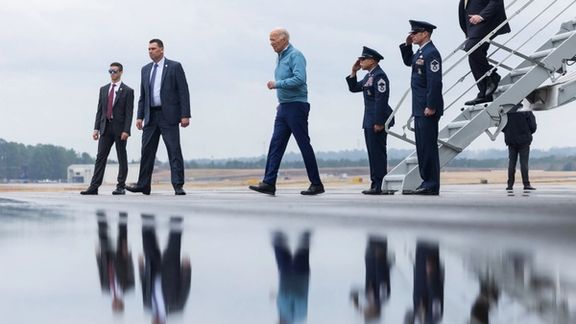"Following the threats posed by the Islamic Republic in the region, especially its support for the Houthis and proxy groups in Iraq in recent months, which led to the formation of an international coalition in the Red Sea, recently, the United States and some Western countries have initiated discussions to intensify sanctions against Iran,” a diplomatic source familiar with ongoing discussions told Iran International. The diplomat added that the sanctions can be similar to what was in place before the JCPOA nuclear deal in 2015.
Iran International asked the US State Department to comment on the diplomat’s revelations, but an official said Washington does not comment on its potential sanctions policies. However, the administration did not dismiss the revelations.
In essence, the diplomatic source indicated that the Biden administration has decided to change its Iran policy, which has relied on diplomacy to persuade Tehran to reduce its uranium enrichment and refrain from regional aggression. In a move to apparently appease Tehran, the US unblocked around $16 billion of Iran’s money in Iraq and South Korea. Now, this potential shift would involve increasing sanctions pressure on the Islamic Republic.
Such a move could entail the activation of the UN Security Council’s ‘trigger mechanism’, a provision within the 2015 JCPOA nuclear agreement. The mechanism allows any participant of the JCPOA to demand the reinstatement of UN sanctions that were suspended when Iran and the world powers agreed to the nuclear deal. These sanctions included an arms embargo, strict monitoring of Iranian financial and technological dealings related to its nuclear and military programs and banking restrictions.
US allies, Britain, France and Germany are still participants in the JCPOA but refrained from activating the trigger mechanism in the past three years, as Tehran began violating nuclear limitations imposed by the JCPOA. The Biden administration was striving to return to the JCPOA, which President Donald Trump abandoned in May 2018, imposing sanctions on Iran.
During intense negotiations in 2021 and 2022, it is believed that the Biden administration decided not to vigorously enforce the Trump-era sanctions. This allowed Iran to boost its oil exports to China through illicit shipping methods. Tehran’s crude exports quadrupled between mid-2020 to late 2023, reaching 1.5 million barrels per day at one point.
Washington and its allies could also boost sanctions without resorting to the JCPOA ‘trigger mechanism.’ Major European countries could join the current US sanctions regime, prohibiting third parties from buying oil from Iran and restricting its international banking relations. Iran now can use the euro more easily than the US dollar in transactions. Europeans could also impose sanctions on third party banks, restricting the use of the euro in transactions with Tehran.
The Biden administration's potential shift in policy towards Tehran comes after the revelation that the United States had warned Iran of a potential terror attack one week before an ISIS twin bombing in Kerman on January 3, which resulted in the loss of 95 lives. Despite this friendly gesture, the Iranian government did not act on the tip, allowing thousands of people to visit the tomb of IRGC's Qasem Soleimani on that day. On the contrary, Iranian officials blamed the United States and Israel for the bombing and reiterated their unfounded accusations that the US has established and maintained the Islamic State group.
The Iranian government organized street celebrations hours after the October 7 Hamas invasion of Israel and the killing of more than 1,100 people, mostly civilians, as well as the taking of around 250 hostages. Tehran, which had armed and trained Hamas forces before the attack, has maintained its public support for the militant organization.
Moreover, its proxy forces in the region, including Shiite armed groups in Iraq and Syria, the Lebanese Hezbollah and Yemen’s Houthis have launched attacks on Israel and US interests. In Iraq and Syria, Iranian proxies have launched more than 150 rocket and drone attacks against US forces.
But a more serious development is the decision by Houthis to use their control over vast coastal stretches of Yemen to target international commercial traffic in the Red Sea area. The attacks began in mid-November after Iran’s Supreme Leader Ali Khamenei called on Muslim countries to blockade Israel. The US and UK have launched retaliatory strikes recently targeting Houthi military capabilities, but their attacks on vessels continue daily.









